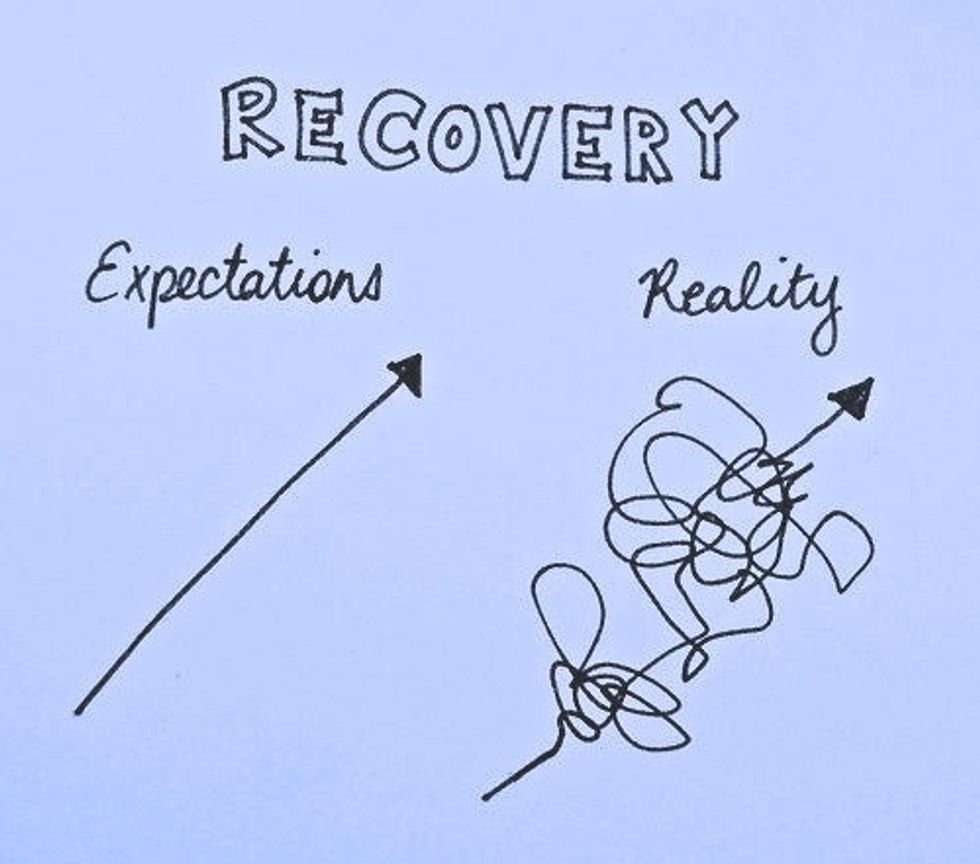A N X I E T Y.
It's really not a pretty word. More than 3 million people in the US are diagnosed with it. We all know what it is, and that's a fortunate and unfortunate thing. The fortunate aspect is that we are continuing to educate ourselves on the mental disorder, and gradually finding more ways to help people cope with it's debilitating effects. The unfortunate side is that we are continuing to learn about this epidemic because it is such a prominent mental illness.
Anxiety is constantly feeling that nagging voice in your head that won't seem to leave you alone even if you tried. It whispers irrational thoughts, and hateful things that make you insecure. It's almost as though you transform into another person - a stranger, an alter ego who is a carbon copy of who you really are, but stitched together with pessimistic thoughts that make you feel physically sick at times. No matter how hard someone tries, they can't seem to shake these toxic reminders of why they're a failure, why they're not good enough, why they'll never be happy, or why they can't "keep it together" long enough; but that's only the half of it.
Sometimes, people with anxiety cry for no absolute reason. They're tense, on edge, and they are worried 24 hours of the day. Their minds work like a broken record, constantly going in circles and repeating the same thought . . . over and over and over again. It's surprising that their minds don't just go up in flames. That's how it is for me, anyway - I feel like I'm so close to burning out because of how overworked my mind is with all of my stresses and panic.
It's debilitating, it's exhausting, and people with anxiety don't plan these things. They don't mean to be difficult, and they're not trying to seek attention. This is the reality. This is their reality.
For those who endure anxiety on a daily basis, it starts to become a normality. Eventually, a person can become so used to those feelings of dread that it's hard to notice whether or not they're experiencing an anxiety attack or secretly screaming inside. After awhile, heart palpitations aren't so strange. An upset stomach, with multiple knots emerging from within is a normal occurrence. The more your heart pounds menacingly in your chest, the excessive sweating, the flushed face, the way you are constantly telling people you feel sick and just want to sleep, even when they don't believe you - it isn't such a peculiar thing after all.
But it shouldn't be that way.
Nobody should be "used to it".
Even though anxiety has been a prominent issue for a long time now, it still isn't necessarily taken seriously - at least, not as much as it should be. It's seen as an "excuse" to some people, which is entirely sad. Anxiety is not pretend. It's not some make-believe illness. Nobody knows what it's like to experience constant fear and what it's like to have a panic attack until they go through it firsthand. All we're really looking for, are people who are willing to have an open mind and learn about the repercussions that anxiety disorder brings along. And it doesn't stop there . . .
Constantly thinking the worst.
Feeling like danger or catastrophe is around every corner.
Avoiding everyday situations because they cause anxiety.
Plagued with this terrible sensation in the pit of your stomach.
And yes, feeling utterly hopeless.
But guess what?
It doesn't have to be so bad. As someone who deals with anxiety and depression on a daily basis, I'm here to tell you about the simplicity of support for someone who is also struggling with this mental illness, and the amazing effects that it has. If you're close to someone who has anxiety, please be patient with them. The tough reality of anxiety disorder is that it doesn't just go away with the snap of someone's fingers.
Remind them how much you love them.
Be supportive of their everyday obstacles.
Let them know why they're amazing.
Watch them be resilient.




















